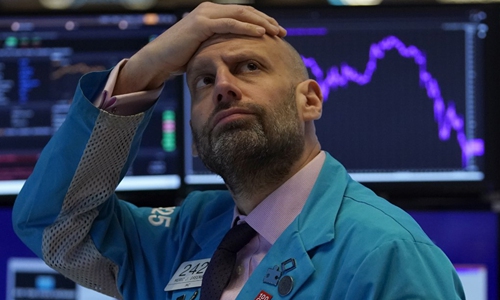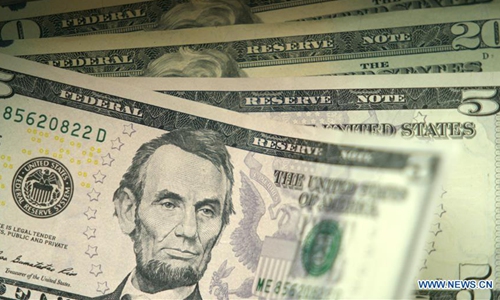HOME >> SOURCE
US faces risk of economic, political crisis
By Wang Cong Source:Global Times Published: 2020/3/11 0:48:40

Meric Greenbaum, Designated Market Maker IMC financial looks up at the board before the opening bell right before trading halted on the New York Stock Exchange on March 9, 2020 in New York. Photo: AFP
Persistent equity sell-offs in the US triggered by panic over the coronavirus outbreak has laid bare deep-seated problems in the US economy and the extremely polarized, volatile political climate in the country, and brought the world's largest economy to the edge of an economic and political crisis with profound global implications, Chinese analysts said.
Though recent sharp declines in US stocks may have been prompted by fear over the rapidly spreading virus and dismay over US officials' bungled response to the epidemic and its economic impact, they are a reflection of growing uneasiness among global investors over the long-term health of the US economy and deepening fallout of Washington's erratic populist economic, trade and foreign policies over the past few years, the analysts noted.
These risks will likely intensify as the presidential election nears, where the focus will be on winning votes through fear-mongering and xenophobic rhetoric rather than taking concrete actions to address problems, putting yet another dark cloud over the global economy, they said. And China, an obvious preferred target for US politicians hungry for a scapegoat, must be prepared for an even more hostile US, analysts noted.
The latest ominous sign for the US economy came on Monday, when Wall Street saw its worst day since the global financial crisis in 2008. Minutes after markets opened, the S&P 500 Index plummeted 7 percent, triggering a circuit breaker for the first time since December 2008.
"This means that the US economy is facing a major crisis. The US economy could go through a temporary shock," a veteran financial analyst who follows US equity market closely told the Global Times on condition of anonymity.
While some US officials, including President Donald Trump, blamed the sharp declines in stocks on plunging oil prices over a looming price war between Saudi Arabia and Russia and hyped- up panic over the virus, many analysts pointed to underlying problems in the US economy.
Among other risks, the US economy is facing mounting government and household debt, decades of wage stagnation despite a low unemployment rate and a declining manufacturing sector, analysts noted.
But above all, "this is a failure of the US' protectionist trade and foreign policies under it's 'America First' agenda," Dong Dengxin, director of the Finance and Securities Institute at the Wuhan University of Science and Technology, told the Global Times, noting that the US-initiated trade wars have caused "systemic damage" to the US economy and it's a significant political crisis the US is being confronted with.
The epidemic and its economic fallout will likely become a hot political topic as the presidential election starts to dominate everything in the US, which is expected to be marred in partisan fights, populist and fear-mongering rhetoric, diminishing any hope of concrete solutions to pressing issues, analysts said.
"Like what I have always said, some would not shed a tear until they see a coffin… It is still too early for some of these bullies to realize the severity of the issues and take reasonable actions, but pressure is building up," said Mei Xinyu, a research fellow at the Ministry of Commerce's Chinese Academy of International Trade and Economic Cooperation, noting the US will likely continue its protectionist trade policies and crackdown on China.

Photo taken on March 3, 2020 shows US dollar banknotes in Washington D.C., the United States.(Xinhua/Liu Jie)
Global impact
The troubles in the US will also have consequences for the global economy, which is already under severe pressure. As Washington is faced with dire risks, it will likely double down on its hostility toward the global multilateral system and fan the flames of the anti-globalization movement, analysts said.
The most immediate impact is that the declines in US stocks have also caused panic in global markets from Europe to Asia.
"If the US falls into recession, everyone will suffer, including China, because the US has a dominant place in the global economy," Dong said, noting that some major economies in Europe might also fall into recessions.
Such a dire outlook also poses serious challenges for the Chinese economy, which while showing stabilizing signs from the epidemic, is heavily integrated into the world economy and relies on rising external demand, analysts said.
"That is why resuming economic activities is extremely important. With a stable domestic situation, China will be able to deal with all these risks, whether its trade wars with the US or a global economic recession," Mei said.
Posted in: ECONOMY